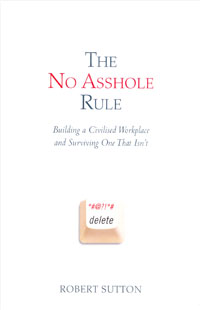 |
Movies voted to be the best in their categories win Academy Awards every spring in Los Angeles. Similarly, books, voted to be the best in categories ranging from romance to science fiction by more than 6,000 booksellers and librarians, win Quill Awards every December in New York.
The Quill Award winner in the category of Best Business Book for 2007 is Stanford University management professor Robert Sutton's colourfully titled bestseller: The No Asshole Rule: Building a Civilized Workplace and Surviving One That Isn't.
Available in Kathmandu's bookstores and written in clear prose, the book starts with an assertion: Jerks who mistreat colleagues and subordinates at workplace by persistently inflicting emotional, verbal or physical distress are ultimately bad for any company. It does not matter how brilliant or productive these jerks are. In the long run, Sutton argues, they are simply not worth the trouble for the company's goals for growth.
But how do you figure out who a jerk is? Sutton proposes two tests: First, after talking with the alleged jerk, do you always feel humiliated, de-energised or belittled? Second, does the alleged jerk always spew venom at people who are less powerful than s/he is? If the answer is 'yes' to both questions, the alleged jerk is likely to be a bone fide jerk.
Sutton lists some everyday actions that jerks use to bring down staff morale. These include personal insults, rude interruptions, two-faced attacks, email flames, threats and intimidation, treating acquaintances as if they are invisible, and the like. Since research shows that negative interactions have a fivefold stronger effect on a person's mood than positive interactions, the jerk's actions add up to a huge cost for any company. Workers lose motivation to work. The best ones head for the door.
The remaining ones fall sick, and many others become more tense, less creative and unproductive. The levels of company-wide trust go down and those of fear go up. Bad news gets neither shared nor solved promptly, and that leads to further problems. Organisational performance suffers. The result is that, over time, the jerk's actions become unaffordable for his or her company.
How can workplaces be jerk-free zones? Since power and pay structures tend to turn even seemingly nice people into insufferable jerks in front of their peers, Sutton advises managers to remove many unnecessary status differences that dot today's corporate landscape. Besides, those leading an organisation must first agree on what the acceptable behaviours at their workplaces are, and then help everyone practise 'small decencies' that result in less stress for all, including clients.
Sutton is aware that even normally nice people act like jerks under certain circumstances. Such acting sometimes serves a purpose, like when you have to shout at a customer-service representative who gets busy on the phone with her boyfriend while repeatedly ignoring your request for help. Other 'temporary' jerks come to their senses soon after their episodes, and have the decency to apologise or try to make amends in some ways. The book's focus, however, is on habitual jerks, and it offers a 24-question test that you can truthfully administer to yourself to see whether you are one of them.
Not everyone has the option to leave a jerk-driven workplace. Sometimes, you are stuck in one. Sutton has a chapter on how to survive in nasty workplaces. Sutton advises reframing how you see things, developing indifference and detachment, and looking for small wins. It's hard to tell whether these tips will work for all. What one can tell is that Sutton has written a lively and useful book on one critical aspect of corporate behaviour that most victims talk about but feel helpless to do much against.



